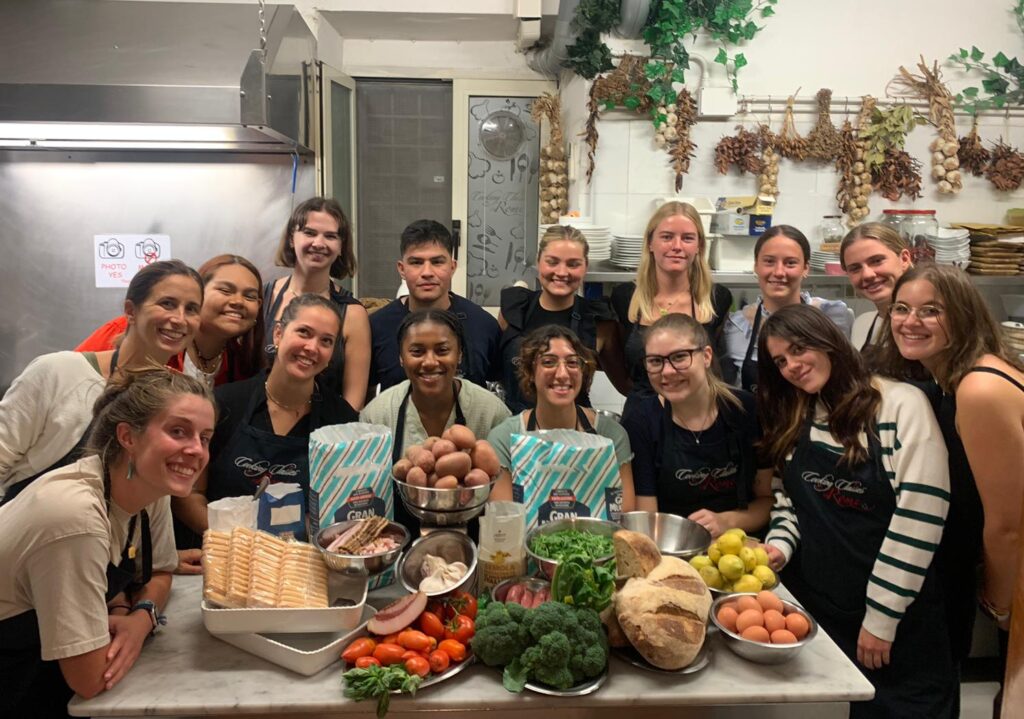Rome Campus J-Term Program
Based on the Aventine Hill, the southernmost of Rome’s seven hills, Trinity’s Rome Campus is surrounded by ancient churches, monasteries, and spectacular views.
Applications are now closed
January 3rd – 16th, 2026 (14 days)
- Applications Deadline September 7th
- Open to Trinity and Visiting Students (First year through Senior year)
- Language of Instructions: English
- Eligibility:
- 3.0 GPA (Exception: first year students will not yet have a Trinity GPA)
- Students must be 18 years or older prior to the program start date
- Students must have a valid passport in hand when they apply
- Food & Culture is a unique offering for first year students only
Selection criteria will be based on student eligibility, personal statement, and resume. Your personal statement should address how participation at the Rome J-Term Program will contribute to your long term academic and professional goals? (150 word requirement). The selection committee will also review your resume for demonstrated preparation for an engaged intercultural experience. Current seniors who applied for the 2025 Rome J-term program and could not attend will be given special consideration.
- Applications will be reviewed after the application deadline
- Given high demand, this will be a selective admission process based on eligibility, personal statement and resume
- Accepted students must commit to the program by September 30th (Extended to October 2nd)
Overview:
Trinity College Rome Campus J-Term program is 14 days and offers three courses constructed in collaboration with local community partners. Students will be enrolled in one 0.5 credit courses taught by Trinity College or Rome Campus faculty. Course offerings are dependent on final enrollment and students will be asked for their course preference.
The Trinity College Rome Campus offers an exciting opportunity for undergraduate students in all fields of study to explore first-hand one of the oldest and most international cities in the world. Trinity College Rome Campus courses facilitate dialogue and collaboration between students, professors, and community partners. Students will gain an understanding of the complexity of interconnected global and local issues in an international and contemporary urban setting.
Courses:
Students will be enrolled in ONE of the three courses below. Students are NOT guaranteed their first choice course.
ROME 105 – EXPLORING AWE: ROME AS LABORATORY – 0.5 TRINITY CREDIT
The psychological literature defines awe as an emotional response to physical or conceptual vastness. It’s an expansive feeling that challenges you to see the world differently and to connect with something larger than yourself. In this course, we will build a theoretical understanding of awe, as conceptualized in the psychological, neuroscientific, and philosophical literature, while using Rome–a city rich with history, art, and human achievement–as a natural laboratory for finding and exploring the phenomenology of awe. Prerequisite: None; Faculty: Michael Grubb
ROME 223 – TRAVEL & SELF-DISCOVERY – 0.5 TRINITY CREDIT
ROME 235 – FOOD AND CULTURE – 0.5 TRINITY CREDIT (OPEN TO FIRST YEAR STUDENTS ONLY)
The saying, “A tavola non s’invecchia” (“One doesn’t age at the supper table”) expresses the importance of food and eating for Italians. In this course, we will examine the relationship between food and culture in Italy, from the ancient world to the present, through a variety of readings, class discussion and some personal and practical experience. Because the study of food culture in Italy invites comparison with your own alimentary habits, we will examine the culture and meaning of food in Italy and in your own country. If “we are what we eat”, then “what” we choose to eat affects many aspects of our lives. The study of food culture is an interdisciplinary study. Even though the historical point of view will be the main one, during our reading, class discussion and lecture we will touch upon a lot of different fields: anthropology, sociology, literature, art, philosophy. Besides studying food culture through readings, written assignments, and class discussion, students will undertake a group-learning project around Rome that will enhance their classroom experience. The course will be taught through a variety of readings, class discussions and presentations and there will also be some practical experiences. Prerequisite: None; Faculty: Valentina Dorato
Housing & Meals
Housing is provided by the program in nearby residence halls. Students should expect to be placed in double bedrooms. The program will provide breakfast and lunch most days. Students are responsible for dinners and most weekend meals.

Cost: $3,800
Includes tuition (.5 Trinity credit), room and partial board (meals), metro pass, extra-curricular activities, staff support, international safety and health insurance.
Does not include airfare, partial board (meals), passport application and fees (if applicable) and spending money.
Financial Aid
Trinity College is pleased to offer J-Term study away financial aid to Trinity students. Aid will be based on financial need and will take into account tuition, room & board, personal expenses and air travel.
Explore. Learn. Grow.
66 Vernon St.
Hartford, CT 06106
